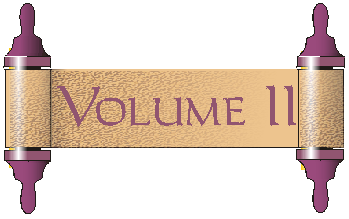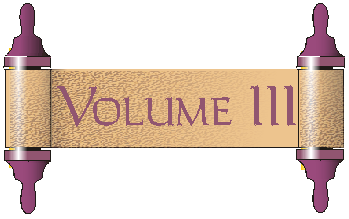



|
 |
VOLUME I |  |

Chapter 10
Miri and Manasseh arrived home early, as Shabbat began that evening. Their weary legs regained their spring as the glorious smells of the Shabbat meals being prepared, and the energy of their neighbours, cleaning and preparing their homes so that no work would be needed to pass the Shabbat. Not even the old men at the gate were there to greet them, for they were indoors supervising their households in Shabbat preparation.
David had recovered from his fever, though Sister Miriam had not. She lay in the shade watching her father preparing the carcass of a small lamb he had sacrificed at sunrise to dispel the fever. The savoury sweet smell of the holocaust, incense and wood smoke still hung in the air.
Maacah bustled into the courtyard, a basket of loaves on each hip, followed by Martha with her own basket.
“I made these!” she announced proudly to Miri.
Miri smiled. “They smell delicious!”
“Have one!”
“I can’t. I am fasting for Shabbat. But I would like one later.” Miri reached into her own apron and produced three poppy seed cakes Mermaat had given her. “Here,” she said to Martha, “These are for Yohanna!” and placed the cakes with Martha’s loaves.
Martha placed the basket on the long table in the courtyard, and covered the loaves with a cloth. David placed the carved meat from the sacrifice on the table.
“You’d better get a move on, Miri, ” he said to her as he carefully placed a cloth over the meat platter, “The Shabbat is near!”
Miri herded her charges into the small kraal, and Manasseh closed the gate.
David greeted Manasseh. “I have prepared for mikvah, so we can all bathe, and Huldah has laid out clean clothes for you Manasseh. If you wish to join the elders in the the village bath, most of the work has been finished here.”
“Bless you, David,” replied Manasseh thankfully, “I am a little weary, and a soak in the mikvah and a little contemplation will bring me back to life!”
Yohanna appeared in the doorway. “Miri!” she cried happily, “You’re just in time to help me fetch some water!”
Miri groaned and Yohanna laughed, “You’re not too tired, I hope?”
Miri shook her head. She was tired, but the promise of the rest of the Shabbat was near, and she reached deep within to find the energy to lift an empty water jar to her shoulder.
“That’s the spirit!” said Yohanna and hugged her.
Yohanna balanced a large clay jar on her head and Miri carried her smaller jug, holding it by the handle. The summer sun washed them in her warm embrace as she sank slowly from the zenith of her diurnal arc. The heat had dispelled the morning dew and silenced the animals around them. The stillness was pregnant with a feeling of warm contentment.
Miri chattered to Yohanna as they walked. She talked of meeting Mermaat-Neteru, not going into great detail, about Manasseh and his herding, and Yohanna talked about the preparation for the Shabbat, their conversation floated on the surface of things, a happy retelling of the day, and the week.
“I have some pomegranates for tomorrow,” said Yohanna.
“David said,” announced Miriam, “Adam and Eve were thrown out from the Garden of Eden because they ate a pomegranate, but Huldah said it was a peach!”
Yohanna smiled at her younger sister, “And which do you think it is?”
“It was neither,” answered Miri with an air of youthful assurance.
Yohanna arched an eyebrow quizzically.
“What do you say it was, Miri,” she asked.
“I don’t think it was a fruit anyone knows,” declared Miri.
“Why not?”
“Well, God said they couldn’t eat it,” Miri began seriously. “So if that was true, then we couldn’t eat it without God throwing us out either.”
“Well, that would make sense, I suppose,” admitted Yohanna.
“Would you eat it if you were Eve?” asked Miri.
“Are you testing me?” asked Yohanna coyly.
“Yes,” replied Miri with an impish grin.
“Then-” said Yohanna, “I would eat it!”
“So would I!” returned Miri, and the two laughed.
They reached the well and sat to rest on the stone wall around the opening. Miri dangled her legs over the inside of the wall and stared down at her own reflection framed within the circle of blue sky sparkling on the surface of the dark water below.
“Why do some people call this the Well of Tears?” She looked at Yohanna. “David calls it Yakobel’s Well, and Manasseh calls it the Well of Shechem?”
“Well, once upon a time, in the days of the Patriarchs, Yakobel, the son of Yitsak who had stolen the blessing of his father intended for his brother Esau, returned from exile in the land of Haran. His brother Esau forgave Yakobel for his dishonesty and welcomed him back to Canaan. After staying for a few days at Succoth, Yakobel came by way of Wadi Farah with his sons and his cattle and his goats and his sheep to this place beneath Mount Gerizim, and petitioned the King of Sychar- this place was known as Sychar in those early days- for leave to pass through this land.’
“A king lived here?” asked Miri.
“King Hamor,” said Yohanna. “Now, Yakobel saw that Sychar was a fertile oasis and supplied with an abundance of the blessings of Astarte, and so he sought permission to remain with his flocks and bought fields from King Hamor for a reasonable sum. The king saw that Yakobel had many, many animals and several sons as well as a beautiful daughter, Dinah. Now as the Sycharites were keeping a festival at the time, after the transaction was concluded, Dinah asked her father if she could go into the town to watch the festival. At first Yakobel balked at allowing his only daughter into a strange town, but King Hamor intervened and vouched for her safety and sent for the women of his court to accompany Dinah to the festival.
Yakobel was not entirely convinced, but Dinah pleaded her case so effectively against the old man’s misgivings, that he finally consented. Yakobel was a dour man and disapproved of gaiety, and disapproved of all gods except Yahweh. Even so, the women in his tribe were from Haran in Mesopotamia and behind his back, adamant in their faithfulness to their own families’ deities. Yakobel turned a blind eye to their ignorance of his own God, and seemed happy as long as they sacrificed to Yahweh. They in turn paid lip service to the Sky God of the Patriarch enough to defuse the wrath of Yakobel, but sacrificed in secret to their own goddess.’
“He knew that the Canaanites, the Sycharites included, were pagans who worshipped the seventy gods, the Children of Asura, so he exhorted Dinah not to eat of the flesh of the sacrifices, and she pledged no meat from the altar of the Canaanite deities would touch her lips.’
“So Yakobel, and his men stayed at their newly bought field and began to dig a well for their animals-”
“This one?” asked a wide-eyed Miri.
“Yes,” answered Yohannah, “This very well!”
Miri stared intensely into the green velvet darkness of the well, her eyes searching for the ghosts of Yakobel as Yohanna continued her tale.
“Now, as I said, the Sycharites were keeping a festival. Dinah dressed in her finery, and with the excitement mounting, accompanied the women of Hamor’s court into the city to see the finery of the women of Canaan. But when Shechem, the son of Hamor-”
“That’s the name of the town now!” interjected Miri.
“Yes it is!” replied Yohanna, “This city is named after him: Prince Shechem of Sychar!”
“Was he handsome?” asked Miri.
“I, uh,” replied Yohanna. “Yes! Yes, he was very handsome.”
Miri settled down, satisfied with this new detail.
“When Shechem, son of Hamor, the king, saw her, he fell in love with her immediately, and desired to know her. And Dinah, although she averted her eyes at his leering, was struck by his beauty as well. At the festival, the people were revelling, drinking beer and wine and feasting on the sacrifices of the festival. They danced madly and Dinah, who had not seen so many celebrating in such a manner to deities who were familiar to her, not by name but by nature, she was carried away by the moment and supped the libations and the fruits of the harvest.
“As the festival proceeded, Dinah came closer to the proximity of Prince Shechem. To others who would have cared to notice, they came together casually, but both Prince Shechem and the maiden Dinah planned their moves privately and carefully, each movement dictated as methodically as the course of the planets.
“Finally they brushed against each other in the throngs of festival goers, and the prince took this opportunity to speak to Dinah. She replied demurely, but with passion smoldering behind her eyes. As they talked, the dancing swung about them and spun them to the edge of the crowd. There, in a quiet place, they sat and began to talk. The prince declared his love for her, and she was taken aback, as she was merely a shepherdess, and not in her wildest dreams could she have imagined that a prince-”
“A handsome prince!” interrupted Miri.
“A handsome prince,” stated Yohanna, “would fall for her in such a fashion. In the passion of the moment, the prince kissed her!”
“He did?” asked Miri, her heart beating.
“Yes!” affirmed Yohanna, “But at that moment, Yakobel found them in the throes of a passionate embrace!
“He was angry at finding his daughter in such a compromising position with a pagan and uncircumcised man, and he denounced the two lovers, pushing aside the protests of innocence from Shechem, and the pleading from Dinah, he took Dinah from the revels, leading her away by the hand. He pulled her so forcefully from the place that one of her slippers fell from her foot.
“The prince spied the slipper and picked it up, then rushed immediately to his father, King Hamor and told him of his ardor, and that he desired his father to make peace with the stranger immediately, and to procure the damsel to whom the slipper belonged for him as his wife. When pressed for the maiden's name, Prince Shechem realized he had not asked the maiden's name. Such was the insistence of his favourite son, King Hamor condescended, and not knowing the damsel of whom his son was enamoured, he travelled with his courtiers bearing the slipper and gifts from the treasury from camp to camp of the nomads who were drawn to Sychar for the festival.
“Nowhere in his kingdom did he find a girl whose foot fitted the slipper his son had given him. Disheartened, he returned to Sychar, and stopped to rest his train at the well of Yakobel. Yakobel greeted the king, and called upon the women of his tribe to fetch water for the king’s camels. Dinah was among the women and King Hamor jumped up immediately as he saw Dinah wore only one shoe, the exact twin to the one he bore with him.
Excitedly, he presented the gifts to Yakobel, and, showing him the slipper, explained his case and asked leave that his son Shechem might, according to the Law, marry Dinah.
“Yakobel was still incensed at the perceived violation of his daughters chastity by Hamor’s son, and by this time also knew that she had eaten from the sacrifices of the Canaanite gods under the influence of the boy, which infuriated him even further. But he did not know how to deny the desire of the king, and pleaded with King Hamor that he did not know if it was lawful to marry his daughter to a stranger, asked some time to think the proposal over.
“So, as soon as his camels were watered King Hamor hurried to tell Shechem he had found the mystery girl whom he loved, with hopes that Yakobel would grant him this marriage. But after Yakobel informed his sons of the defilement of their sister, and of the address of Hamor, and asked of them their advice of what he should do, all his sons were shocked. They were enraged at the liberty and immorality of the Sycharites. They agreed that according to the Law, Shechem must marry their sister as they believed that the two lovers had laid together and the Law says that he must marry, but Shimeon and Levi, sons of Leah, the same mother as Dinah were outraged that this rapist would be allowed to marry their sister. So they agreed to set the terms of the marriage so Shechem would not accept their demand. They then sought and audience with Hamor and laid down their terms.
“They said to him, ‘We cannot let our sister be married to a man who is not circumcised. According to our customs, we would be disgraced. We can agree only on the condition that you join with us by circumcising all your males. Then we will agree to this marriage between our peoples. Then we will settle among your people as brothers and become one people with you. But, if you do not accept our terms, we will take her and leave.’
“These terms were onerous to Hamor and his followers and caused much consternation, but the desire of Shechem for Dinah was so strong that he pursuaded his brethren to accept the terms, and the young man lost no time to offering himself to the flint knives of the tribe of Yakobel.
“Such was the zeal of the young Shechem, that he convened a gathering at meeting place at the city gates under the eyes of Yakobel’s tribesmen. ‘These strangers in our land shall soon be our friends; once we are joined by marriage, then the Habiru shall be our kin. Their arms shall be as our arms. We will allow them to live in Canaan with us and travel freely. The land is large enough for us all and for them also. Let us marry their daughters, and they to ours. They will share with us their wealth in livestock and their knowledge of the sheepfolds and pastures as we will share the bounty of the barley field and vinyards.’
“And so the marriage of Shechem and Dinah was prepared and the men of Sychar offered themselves up to the knives of the tribe of Yakobel for circumcision. But the sons of Yakobel, the brethren of Dinah, concealed swords and clubs beneath their robes and carried them into the city without arousing suspicion. Then, as the men of Sychar presented themselves to be circumcised, the sons of Yakobel set upon all the men of Sychar, who were unarmed, stabbing them with the ritual knives and slaying them all, including Prince Shechem and King Hamor with their clubs and swords.
“They took Dinah from Shechem’s house, and the men of Yakobel’s tribe looted the town of Sychar for revenge of their sister’s perceived disgrace. They took everything of value and even carried off the women and children of Sychar.
“When Yakobel heard of the treachery of his sons he declared to Shimeon and Levi who had hatched the plot, ‘You have brought a terrible curse upon me. Now the Canaanites and every other tribe in this land will fear me and hate us. I have only a few men. If all our neighbours hear of this calamity and band together, our whole family will be annihilated!’
“Dinah was heart broken by the loss of her suitor, and as her brothers were arguing with their father as to what course of action they should take, she stole the knife with which Shimeon had stabbed Prince Shechem to death and ran toward the city of Sychar to seek the body of Shechem so she could join him in death!
“Judah, one of Dinah’s brothers noticed her departure and alerted the others. Seeing that they would soon overtake her and prevent her from joining her lover, she ran to the edge of the well that Yakobel and his tribesmen had dug on their arrival, and stood facing her kinsmen with a ritual flint knife raised.
“‘You have killed the men of Sychar and wronged them grievously!” she shouted hysterically at her brothers. “My maidenhood is still intact, and the man I wished for a husband has been murdered on account of me! I have no wish to live!’
“But they answered, ‘We cannot let our sister be treated like a common whore!’’ and they rushed toward her to wrest the knife from her hand.
“Dinah in her despair, flung herself from the rim of the well into the pit below. The brothers climbed down after her, but she had fallen on the knife and pierced her heart. And the youngest brother, who had not taken part in the killing said he saw a single tear drip from Dinah’s open eye and it dripped from her cheek and fell to the soil. As it soaked into the ground, a fountain sprang up and began to fill the pit. They had to scramble quickly out of the well to save themselves from drowning in the tears of their dead sister!”
“What happend to Yakobel?”
“He and his family fled from Sychar which was rebuilt by the survivors of the massacre and they named it Shechem after the prince whose blind love had caused it’s downfall.”
“Why didn’t Dinah tell her father Shechem was innocent, right away?”
“Perhaps she did, but men give little countenance to the words of a woman. And fathers allow no room for a daughter to rebel.”
“Why?” asked Miriam.
Yohanna sighed and slipped a rope over the mouth of her jar and cinched it tightly around the clay neck.
“That,” replied Yohanna, “is the thirty-four shekel question!”
And she lowered the jar into the Well of Tears.
![]()

